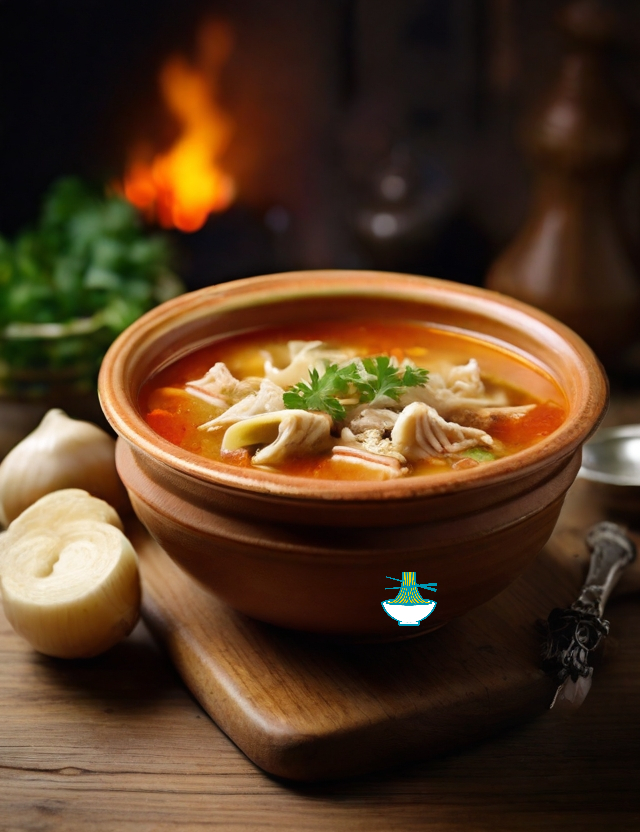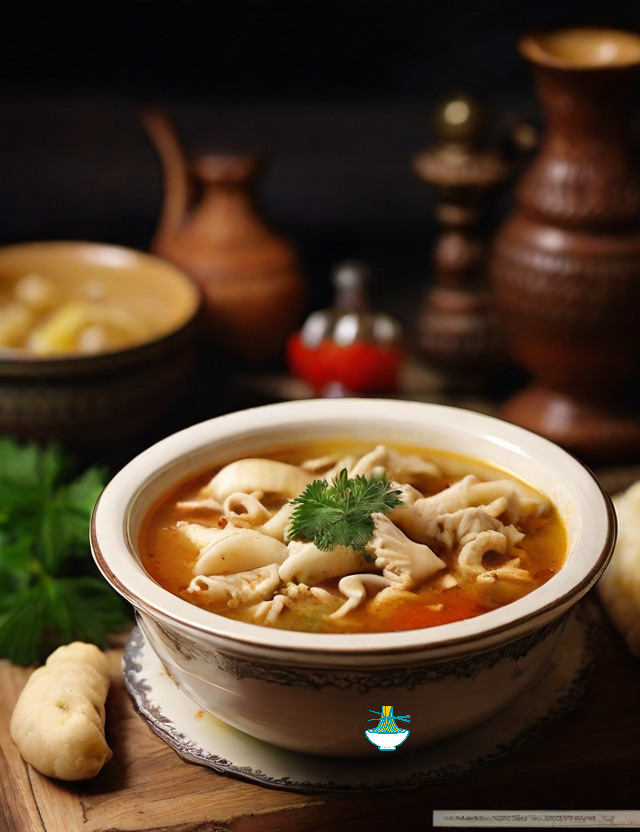Embark on a culinary journey to Bulgaria as we explore the rich flavors and cultural heritage encapsulated in the traditional dish known as Shkembe Chorba. Hailing from the heart of Balkan cuisine, this hearty soup is a beloved staple in Bulgarian households, cherished not only for its robust taste but also for its historical significance.
Shkembe Chorba, a soup made primarily from tripe, is deeply rooted in Bulgarian culinary traditions, reflecting the resourcefulness of the country's people and their ability to turn simple ingredients into a culinary masterpiece. Join us as we delve into the intricacies of preparing this iconic dish, where tradition meets gastronomy in a steaming bowl of aromatic delight. Get ready to awaken your taste buds and discover the soul-warming essence of Bulgaria with our step-by-step Shkembe Chorba recipe.
Ingredients:
- 500g beef tripe, cleaned and sliced into thin strips
- 1 large onion, finely chopped
- 2 cloves garlic, minced
- 2 tablespoons vegetable oil
- 2 tablespoons white vinegar
- 1 tablespoon paprika
- 1 tablespoon red pepper flakes (adjust to taste)
- 1 teaspoon ground cumin
- 1 teaspoon dried mint
- 1 bay leaf
- Salt and black pepper to taste
- 1 cup yogurt
- 2 tablespoons white flour
- 2 eggs
- Fresh parsley, chopped (for garnish)
- Lemon wedges (for serving)

Instructions:
Prepare the Tripe:
1-Thoroughly clean the beef tripe, removing any excess fat or membranes.
2-Cut the tripe into thin strips and soak them in a bowl of water with vinegar for at least an hour. Rinse well.
Cook the Tripe:In a large pot, bring water to a boil. Add the tripe and cook for about 20-30 minutes until tender. Drain and set aside.
Sauté Aromatics:In a separate pot, heat vegetable oil over medium heat. Add chopped onions and garlic. Sauté until golden brown.
Spice it Up:Stir in paprika, red pepper flakes, cumin, dried mint, bay leaf, salt, and black pepper. Cook for an additional 2-3 minutes to enhance the flavors.
Simmer the Soup:Add the cooked tripe to the pot with the sautéed aromatics. Pour in enough water to cover the tripe and bring the mixture to a simmer. Allow it to cook for about 30-40 minutes until the tripe is tender.
Prepare the Yogurt Mixture:In a bowl, whisk together yogurt, flour, and eggs until smooth. Slowly add a ladle of the hot soup to the yogurt mixture, stirring constantly to avoid curdling.
Thicken the Soup:Gradually pour the yogurt mixture back into the pot, stirring continuously. Cook on low heat for an additional 10-15 minutes, allowing the soup to thicken.
Adjust Seasoning:Taste and adjust the seasoning, adding more salt or pepper if needed.
Serve Hot:Ladle the Shkembe Chorba into bowls. Garnish with fresh parsley and serve with lemon wedges on the side.
Enjoy:Dive into the comforting depths of this traditional Bulgarian hangover remedy, letting the robust flavors revitalize your senses. Serve with crusty bread for a complete and satisfying experience.
Nutritional Values
It's challenging to provide precise nutritional values as they can vary based on specific brands and preparation methods. However, I can offer general estimates for some of the key ingredients in your Shkembe Chorba recipe:
Beef Tripe (500g):
- Calories: Approximately 500 kcal
- Protein: Around 45g
- Fat: About 30g
- Carbohydrates: Minimal
benefits:
- Rich in protein, essential for muscle development and repair.
- Contains essential minerals like zinc, iron, and selenium.
Onion (1 large):
- Calories: Approximately 60 kcal
- Protein: Around 1g
- Fat: Almost negligible
- Carbohydrates: Around 14g
- Fiber: Approximately 3g
benefits:
- High in antioxidants that support overall health.
- Provides dietary fiber for digestive health.
- Contains vitamins C and B6, promoting immune function and metabolism.
Garlic (2 cloves):
- Calories: Around 10 kcal
- Protein: About 0.5g
- Fat: Almost negligible
- Carbohydrates: Around 2g
- Fiber: Approximately 0.2g
benefits:
- Known for its antimicrobial properties.
- Contains allicin, which may have cardiovascular benefits.
- May help regulate blood pressure and cholesterol levels.
Vegetable Oil (2 tablespoons):
- Calories: Approximately 240 kcal
- Fat: About 28g
- No protein or carbohydrates
benefits:
- Source of healthy fats, including monounsaturated and polyunsaturated fats.
- Contains vitamin E, an antioxidant that supports skin health.
White Vinegar (2 tablespoons):
- Calories: Around 4 kcal
- Almost negligible in terms of fat, protein, and carbohydrates
benefits:
- May help regulate blood sugar levels.
- Adds a tangy flavor without additional calories.
Paprika (1 tablespoon):
- Calories: Around 20 kcal
- Protein: Approximately 1g
- Fat: About 1g
- Carbohydrates: Around 4g
- Fiber: Approximately 2g
benefits:
- Rich in antioxidants, such as vitamin A and carotenoids.
- May have anti-inflammatory properties.
Red Pepper Flakes (1 tablespoon):
- Calories: Around 17 kcal
- Protein: About 0.7g
- Fat: Approximately 1g
- Carbohydrates: Around 3g
- Fiber: Approximately 1g
benefits:
- Contains capsaicin, which may boost metabolism.
- May have pain-relieving and anti-inflammatory effects.
Ground Cumin (1 teaspoon):
- Calories: Around 8 kcal
- Protein: Approximately 0.3g
- Fat: About 0.5g
- Carbohydrates: Around 1g
- Fiber: Approximately 0.1g
benefits:
- May aid digestion and promote gut health.
- Contains antioxidants and may have anti-inflammatory effects.
Dried Mint (1 teaspoon):
- Calories: Around 2 kcal
- Almost negligible in terms of fat, protein, and carbohydrates
benefits:
- Known for its soothing properties, helping with digestion.
- Adds a refreshing flavor to dishes.
Yogurt (1 cup):
- Calories: Approximately 150 kcal
- Protein: Around 12g
- Fat: About 8g
- Carbohydrates: Around 9g
- Sugar: Approximately 9g
benefits:
- Excellent source of probiotics for gut health.
- High in calcium and protein for bone and muscle health.
White Flour (2 tablespoons):
- Calories: Around 50 kcal
- Protein: About 1g
- Fat: Almost negligible
- Carbohydrates: Around 10g
- Fiber: Approximately 0.4g
benefits:
- Contains carbohydrates for energy.
- Provides some dietary fiber.
Eggs (2):
- Calories: Approximately 140 kcal
- Protein: Around 12g
- Fat: About 10g
- Carbohydrates: Almost negligible
benefits:
- Excellent source of high-quality protein.
- Rich in essential vitamins, including B12 and D.
Fresh Parsley (for garnish):
- Calories: Almost negligible
- Provides small amounts of vitamins and minerals
benefits:
- Contains vitamins A, C, and K.
- Acts as a natural breath freshener.
Lemon Wedges (for serving):
- Calories: Almost negligible
- Provides small amounts of vitamin C
benefits:
- Rich in vitamin C, supporting immune function.
- Adds a citrusy flavor to dishes.
Keep in mind that these are rough estimates, and actual values may vary. Additionally, the way you prepare the dish, such as the amount of oil used or the specific type of yogurt, can impact the nutritional content.


Comments